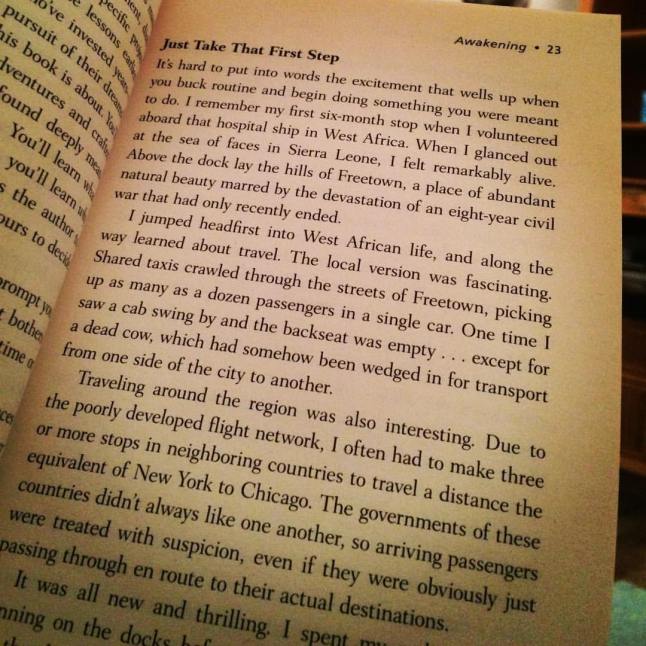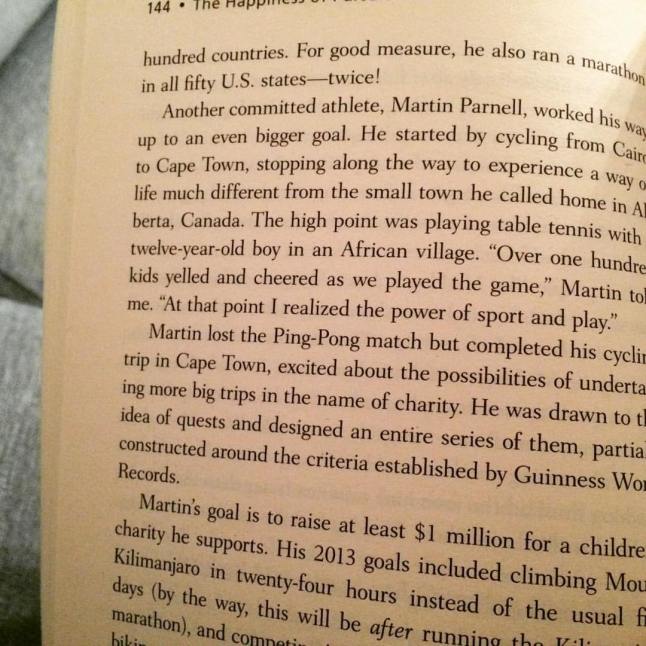Yesterday I started and finished “The Happiness of Pursuit” by Chris Guillebeau. Guillbeau visited every country in the world by the time he was thirty-five (a fact he reminds readers of every few pages) and the book is supposed to be an exploration of how you too can find your own quest. According to Guillebeau, quests are projects that have a clear goal, a specific end point, and a defined set of milestones. Examples of quests are Guillebeau’s journey to visit every country in the world, a project to visit every basilica in the US, a project to walk across the US, a quest to never travel by car again, and the list goes on. This could have been an interesting read, but instead is just a poorly written book with no critical reflection and or ability to mention any African country without using stereotypes or using actual country names. When he talks about North America, he mentions specific town and city names (Manitoba, St. Louis etc) when he talks about an African country, he simply talks about visiting Africa. Here are (some) examples:
In addition, this book is completely devoid of any critical reflection or analysis of what it means to do a “quest”, and who gets to travel and pursue ridiculous journeys. There is no racial analysis, no discussion of privilege, and no examination of whether it is a good idea to seek meaning that is missing from your everyday life in a “faraway locale.” The chapters on creating personal lists and goal setting are interesting, but the flaws in this book make it impossible to take his advice seriously. Guillebeau says everyone can travel anywhere as long as they can save at least $2 a day, and seems unaware that that isn’t a measure that everyone can meet. Poverty and bills and responsibilities are not important variables as to whether or not someone can leave their life and go, in this book travel and adventure simply require that you are uncomfortable with your life and want to make a change in order to go out and do these things. He does spend a bit of time saying that you can do quests in the way that is meaningful for you, but he gives unrealistic examples of scaling down. For instance, if you feel like you can’t visit all the countries, 30 countries is pretty good too!
What isn’t discussed is that there are good and bad reasons to do a quest. He speaks of a friend who “after years of debauchery as a New York City nightclub promoter” finds his calling bringing clean water to Africa. He tells the story of another person who wants to connect with different cultures and decides to cook a different dish for her family from each country in the world. The ethics and validity of both of these projects are very different because the reasons for each project is very different, but there is little analysis in this book of personal motivations or broader political implications of the quests that people undertake. What does it mean to support oppressive regimes through travel? This a question that should be talked about because of the stories Guillebeau chooses to include, but isn’t discussed at all.
Last year I read “The Unlikely Pilgrimage of Harold Fry” a delightful fictional read about a man who walks 500 miles across England to visit a colleague who is dying of cancer. The journey heals his marriage and his life, but he travels across small towns of England in his own country. Harold Fry’s journey is charming and sweet, this book is the opposite of that.
Further Reading:







